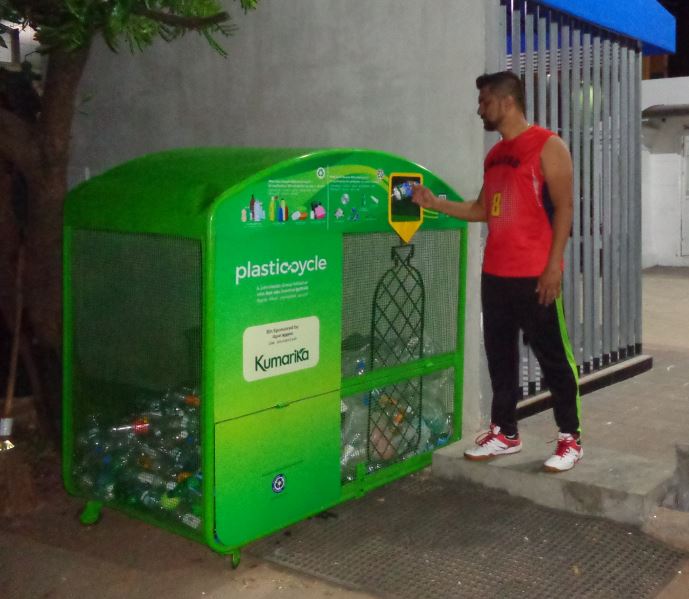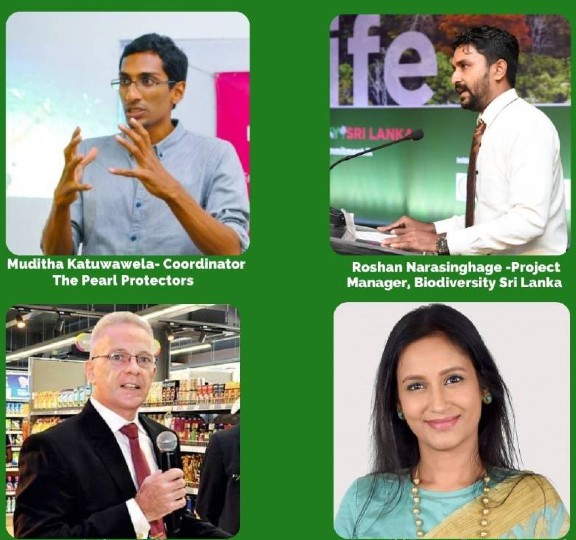Plasticcycle, the Social Entrepreneurship Project of the John Keells Group hosted “Plastics: It’s Now or Forever” on 11th June 2021, a multi-stakeholder webinar in lieu of World Environment Day closely looking at the theme of ‘eradicating and mitigating plastic pollution to restore ecosystems’. The panel moderated by Talitha Perera – Executive Plasticcycle comprised of Andrew Dalby CEO Softlogic Supermarkets (Pvt) Ltd, Amanthi Perera Deputy General Manager for Strategic Sustainability at MAS Holdings, Roshan Narasinghage Project Manager Biodiversity Sri Lanka (BSL) and Muditha Katuwawala, Coordinator, The Pearl Protectors.
The webinar focused on the effects of plastic pollution in ecosystems and the resultant policy tool of Extended Producer Responsibility (EPR) including its benefits to the environment and economy. The discussion highlighted the measures taken by each stakeholder group from advocacy initiatives by The Pearl Protectors, a marine conservation organization seeking to reduce plastic pollution in the oceans, to the EPR Roadmap development by BSL, a national platform operated through the commitments of the corporate sector towards the sustainable development of Sri Lanka.
As contributors towards circular economies, both panelists representing MAS Holdings and GLOMARK Supermarkets spoke of the initiatives taken up by their respective organizations, and the challenges overcome by these companies to minimize the plastic footprint within their organisations, communities, and industries.
Reiterating the need to adhere and maintain limitations upon policies which have already been implemented, The Pearl Protectors, Coordinator Muditha Katuwawala said, “An estimated 12.7 million tonnes of plastic enter the ocean every year and over 50% of marine litter is composed of single use plastic created by an use & dispose culture which is propelled by human activity”.
Further supplementing on the topic of EPR, BSL Program Manager, Roshan Narasinghage underscored, “While EPR has been successful in countries such as Norway where 97% of plastics bottles entering the markets are recycled, we should note that EPR alone won’t solve post-consumer plastic waste issue in Sri Lanka”.
“One key component of the proposed Roadmap is the Mandatory Report and Collect-Back Model for Sri Lanka which will be rolled out initially targeting PET and HIPS plastics through a facilitated process involving the Ministry of Environment, Central Environmental Authority, Ceylon Chamber of Commerce and Biodiversity Sri Lanka and contains multiple proposals including the one to establish a Research and Development Fund with contributions from Corporate Sector to develop and produce alternatives for plastic packaging in commercial scale.”
Reflecting on the role of retailers as they address the issue on the mismanagement of post-consumption waste plastic, CEO of Softlogic Supermarkets Andrew Dalby said, “The retail industry has been working towards implementing a charge on plastic bags which would be initially rolled out among supermarket chains across the industry. However, due the Fundamental Rights Act retailers are bound by legislation to provide free plastic bags at checkout which has proven counterproductive to the many efforts taken within GLOMARK to reduce our customer’s and the organisation’s plastic footprint”.
Plasticcycle together with the Retailer’s Association and the Ceylon Chamber of Commerce has submitted a framework proposal to the Ministry of Environment to implement a nominal charge on plastic bags issued at retail outlets. Upon the approval of the Ministry, the proposed framework is to be rolled out among larger supermarket chains. All collected funds will be utilized for further CSR functions among the retailers implementing the proposed plastic bag charge.
Further emphasising the need for circular practices, MAS Holdings, Deputy General Manager for Strategic Sustainability, Amanthi Perera said, “Reducing our internal plastic footprint and developing raw materials by using recycled plastics are only some of the many steps which we have taken towards mitigating plastic pollution caused by our businesses . However, complete circularity can only be achieved when waste from the cutting tables as well as post-consumption clothing and material reenter our manufacturing process at a critical scale. Until we achieve this, we will continue to collaborate with our brands, supply chain partners and the consumer to work through the challenges that exist in the current system.”
Established in 2017, Plasticcycle works together with the Sri Lanka Recyclers Association (SLRA) and manufacturing companies to recycle and manufacture value-added products from post consumption plastics, such as plastic monofilaments used for cleaning tools and yarn for fabric manufacturers worldwide.
Plasticcycle continuously promotes the 4R’s – ‘Refuse, Reduce, Reuse and Recycle’, focusing on three key pillars: Encouraging the reduction and rationalization of use, supporting responsible disposal; and Promoting recycling initiatives. The project, to date has collected over 76 MT of plastic waste and sent for responsible disposal. The virtual event which was live streamed can now be accessed via the Plasticcycle Facebook page.
Plasticcycle is a social entrepreneurship project of John Keells Holdings (PLC), Sri Lanka’s largest listed company in the Colombo Stock Exchange operating over 70 companies in 7 diverse industry sectors and in 2020 John Keells Group celebrates 150 years being in business and contributing to the Sri Lankan economy and development of the country. JKH provides employment to over 14,000 persons and has been ranked as Sri Lanka’s ‘Most Respected Entity’ for the last 15 Years by LMD
Magazine. Whilst being a full member of the World Economic Forum and a Member of the UN Global Compact, the Group drives its vision of “empowering the nation for tomorrow,” through the John Keells Foundation and through the social entrepreneurship initiative, ‘Plasticcycle’, is a catalyst in scientifically reducing plastic pollution in Sri Lanka.
.jpg)

